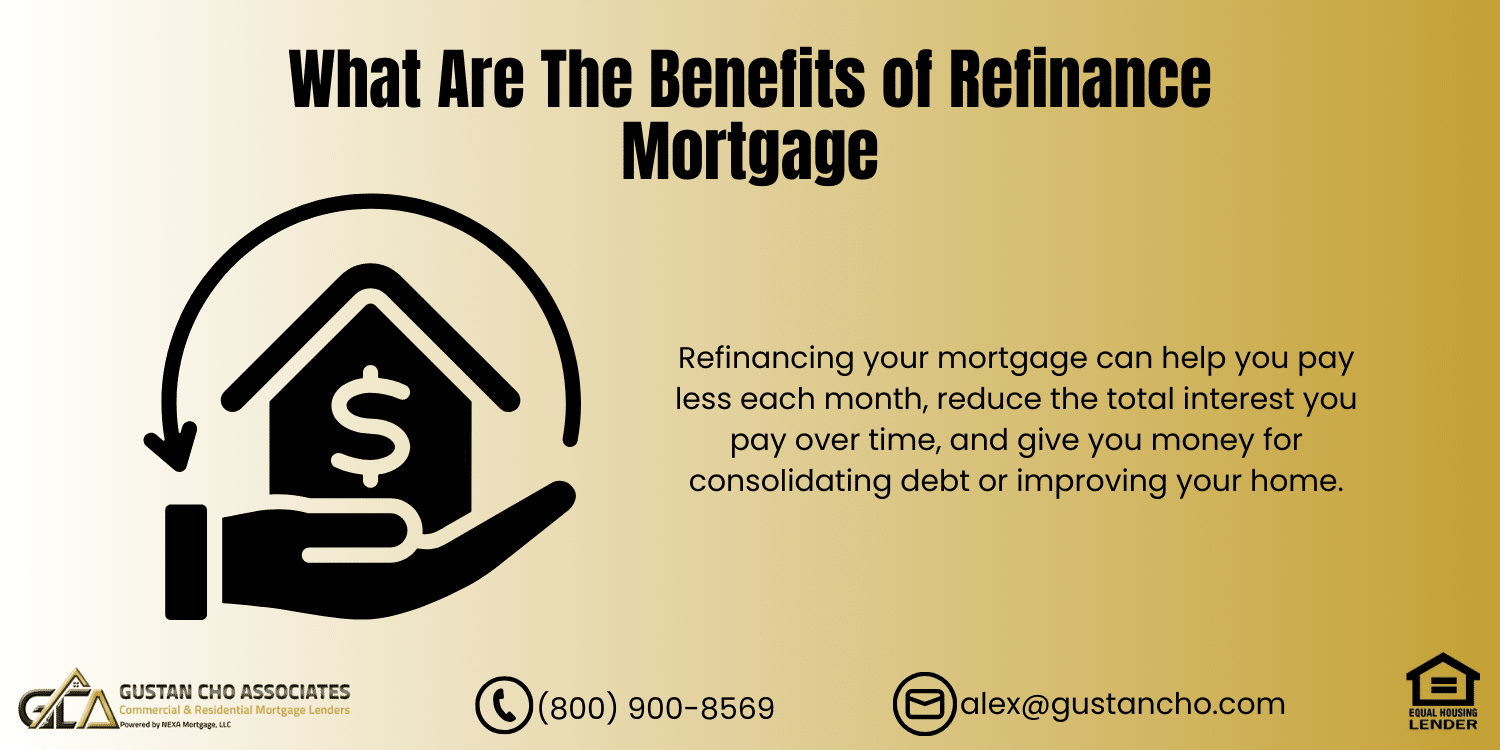This guide covers the benefits of refinance mortgage loans. There are many benefits of refinance mortgage. Although the Federal Reserve Board has recently raised interest rates by 0.25% basis points, mortgage rates are still at historic lows. Nobody has a crystal ball, but mortgage interest rates cannot remain this low forever. The Feds are closely monitoring the economic data and unemployment numbers.
Any signs of the economy getting much better will spike interest rates again. Homeowners who have not refinanced their high-interest mortgage loans yet should consider the benefits of refinance mortgage.
Whether considering a rate and term refinance to lower monthly payments or refinancing to take out non-occupant co-borrowers options on its benefits should be explored. Refinancing FHA Loan To Conventional Loan To Eliminate MIP or doing a cash-out refinance mortgage to pay off debts are other benefits of refinance mortgage homeowners should consider. There are many benefits of refinance mortgage while mortgage interest rates keep on increasing. We will be discussing the major benefits of refinance mortgage and see if refinancing will be a great benefit for homeowners.
Benefits of Refinance Mortgage Before Rates Go Up
The recent announcement by the Feds that they raised interest rates by 0.75% was long-expected. The Federal Reserve Board has been delaying raising interest rates for quite some time. Mortgage rates are currently at their highest level it has been since 2008. The intention of the Feds is to keep on increasing interest rates. The Feds will be carefully watching the economy.
With any spark in the economic numbers and signs of economic growth, consumers can bet that the Federal Reserve Board will not hesitate to increase interest rates in the coming months.
Mortgage rates will not remain this low forever. It is not if mortgage rates will go up. It is when mortgage rates will go up. The Federal Reserve Board plans to raise short-term interest rates very shortly, where if short-term interest rates go up, mortgage rates will also go up. Keeping this in mind, with low rates, it is a great time to refinance mortgage loans into a lower mortgage rate.
Click her to apply for FHA and VA Loans from Gustancho Associates
Comparing 15-Year Fixed Versus 30-Year Fixed Rate Mortgage

Home loans with amortization loan terms such as the 40-year fixed rate mortgage will come with higher fixed-rate versus a 15-year fixed-rate loan. Shorter term loans normally have lower fixed-rates due to the lower risk for the lender.
Remember that 15-year fixed-rate mortgage loans have much lower mortgage interest rates than 30-year fixed mortgage rates. The much lower mortgage interest rates borrowers get quoted may benefit them from getting a 15-year fixed-rate mortgage loan. Borrowers may get a similar monthly payment or a slightly higher monthly housing paymen if they refinance their home loans to a lower mortgage rate and benefit if they can eliminate the mortgage insurance with the new refinance mortgage loan. Borrowers may be able to afford the 15-year fixed-rate mortgage and shave 15 years off the life of the mortgage loan.
Benefits of Refinance Mortgage To Do Cash-Out Refinance
Homeowners with equity in their homes with large outstanding debts should consider doing a cash-out refinance mortgage loan. To be eligible for a cash-out refinance mortgage, homeowners need equity in their loans. Fannie Mae, HUD, and non-QM loans allow cash-out refinance mortgage for homeowners with at least an 80% loan-to-value. Homeowners can take the cash from refinance mortgages and pay off their high-interest credit cards and other high-interest bills.
Benefits of Refinance Mortgage with Shorter Amortization Term
Mortgage interest rates are substantially lower than credit card interest, car loan interest, and other interest rates on other debt. Average mortgage rates are in the 6.0% rate whereas average credit cards interest rates are north of 24%. Some credit card annual percentage rates even surpass the 30% interest rate. Besides high interest rates, minimum credit card and installment loan payments can be higher due to shorter amortization terms. Proceeds of cash-out refinance mortgage loans are not taxable. No matter how much to tap into your home equity, you will not pay taxes on the proceeds.
Cash-Out Refinance Mortgage Guidelines
Homeowners can use the proceeds of their cash-out refinance mortgage loan for any purpose they like. Lenders or the government agency will not require or restrict on where you can use the proceeds of the cash-out refinance mortgage loan. Homeowners can use the proceeds of debt consolidation cash-out refinance mortgage loans to retire their outstanding debts such as pay off outstanding credit cards, pay off car loans, student loans, and other debts.
There is no restrictions on how homeowners use the proceeds of their cash-out refinance mortgage loans. They can pay outstanding debts, purchase high ticket items, invest, or take an extended vacation.
Borrowers can also use the proceeds of the cash-out refinance loans to buy a second home, pay for college tuition, take care of elderly parents, renovate their homes, or for investment purposes. Average college tuition for undergraduates is over $30,000 per year, and many homeowners help their children with their college expenses with the equity they have in their homes with a cash-out refinance mortgage.
Click her to get guideline on cash-out refinance mortgages
Other Benefits of Refinance Mortgage
Another reason homeowners may consider refinance mortgage is to take out non-occupant co-borrowers. Folks who are divorcing normally want their spouse off the mortgage and may need to do a refinance mortgage. As mentioned earlier, many homeowners with FHA loans may be able to eliminate FHA annual mortgage insurance premiums by refinancing their FHA loans to Conventional loans.
Refinancing FHA to conventional loans with no private mortgage insurance requires homeowners to have at least a 20% equity in their homes. Cash-out refinancing on FHA or conventional loans has a maximum debt-to-income ratio cap of 80% LTV.
Refinancing to a conventional loan from an FHA loan with no private mortgage insurance can save homeowners tens of thousands of dollars in mortgage interest and private mortgage insurance expenses.
Homeowners with less than 20% equity in their homes can also refinance from FHA to LPMI conventional loans with no private mortgage insurance. LPMI stands for lender paid mortgage insurance. Homeowners can pay one larger private mortgage insurance premium on conventional loans similar to the one-time 1.75% upfront FHA mortgage insurance premium and not be required to pay the annual private mortgage insurance premium.
Private mortgage insurance is not required on conventional loans for homeowners with at least 20% equity in their homes. Homeowners with at least 20% home equity in their homes can request the private mortgage insurance be canceled.
FAQs: What Are The Benefits of Refinance Mortgage
- 1. What are the benefits of refinance mortgage loans? Refinancing your mortgage can help you pay less each month, reduce the total interest you pay over time, and give you money for consolidating debt or improving your home.
- 2. How do I know if refinancing my mortgage is the right choice? If the current interest rates are lower than your current mortgage rate, or if you need to change your loan terms, such as moving from an adjustable-rate to a fixed-rate mortgage, consider refinancing.
- 3. Can refinancing help me pay off my mortgage faster? Consider refinancing to a 15-year fixed-rate mortgage to pay off your mortgage more quickly and reduce interest costs in the long run.
- 4. What is a cash-out refinance mortgage? A cash-out refinance mortgage allows you to take out a new loan for more than your current mortgage balance. This gives you access to the extra money in cash, which you can use for other expenses.
- 5. What are the benefits of refinance mortgage with a cash-out option? This option allows you to combine your high-interest debts, like credit card balances or personal loans, into one with lower-interest payment.
- 6. How do interest rates affect the benefits of refinance mortgage? Refinancing can be beneficial because lower interest rates can reduce your monthly payments and the total amount of interest paid over the life of the loan.
- 7. Can I remove a co-borrower by refinancing my mortgage? Yes, refinancing can remove a non-occupant co-borrower from the mortgage, which is especially useful in situations like divorce.
- 8. What are the benefits of refinance mortgage from an FHA loan to a conventional loan? Refinancing from FHA to a conventional loan can eliminate mortgage insurance premiums if you have at least 20% equity in your home, saving you money.
- 9. Is there a way to refinance without paying private mortgage insurance (PMI)? Yes, if you have at least 20% equity in your home, you can refinance into a conventional loan without PMI or opt for lender-paid mortgage insurance (LPMI).
- 10. What should I consider before deciding to refinance my mortgage? Consider your financial goals, current mortgage terms, interest rates, and how long you plan to stay in your home. Speaking with a mortgage professional will help you understand the benefits of refinancing your mortgage to fit your situation.
For more information on the benefits of refinance mortgage, please get in touch with us at Gustan Cho Associates Mortgage Group at 800-900-8569 or text us for a faster response. Or email us at gcho@gustancho.com. Borrowers can also email us at gcho@gustancho.com. We are available evenings, weekends, and holidays seven days a week.








